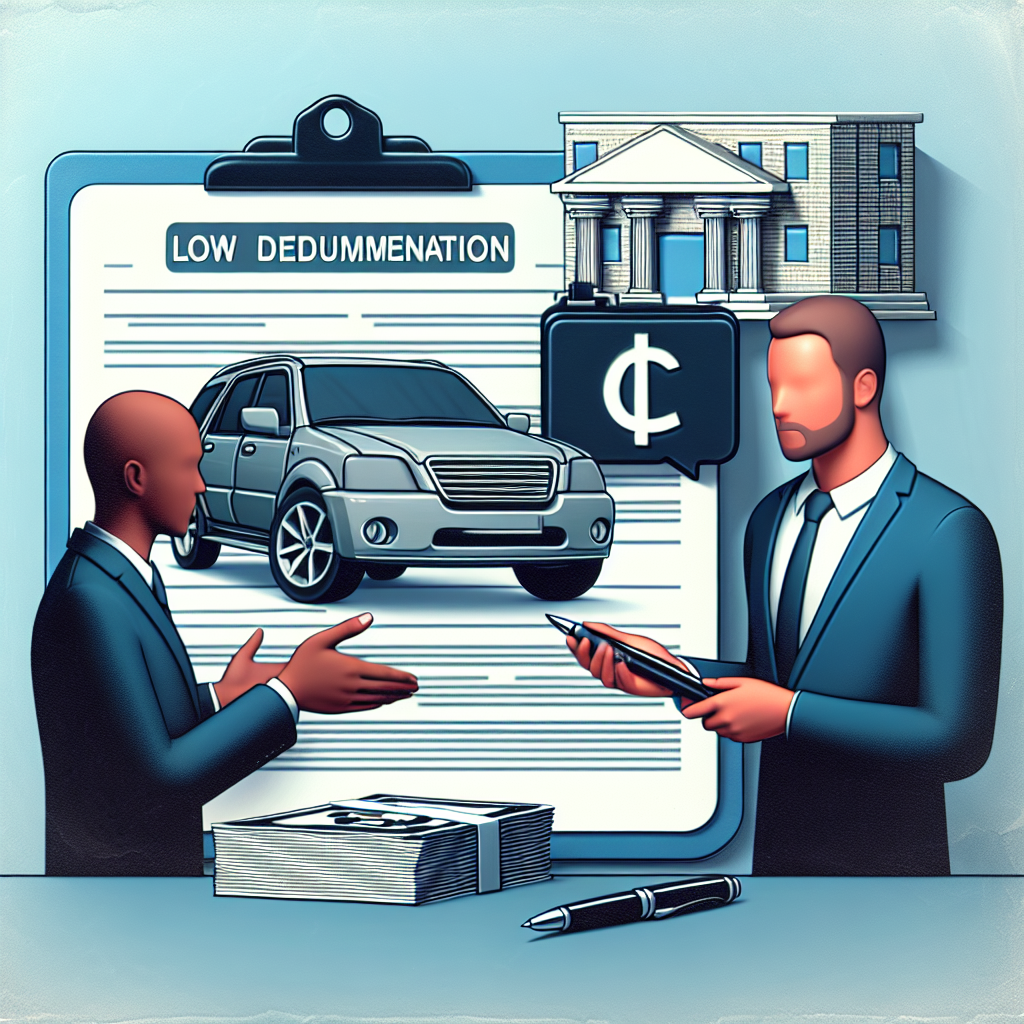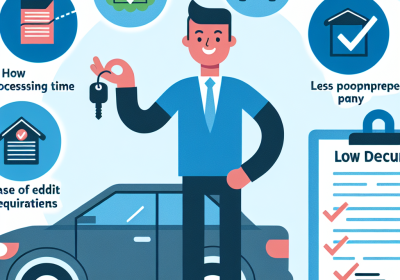What are low doc car loans?
-
Table of Contents
Low doc car loans, short for low documentation car loans, are a type of auto financing designed for individuals who may not have the traditional proof of income or financial documentation typically required by lenders. These loans are particularly beneficial for self-employed individuals, freelancers, or small business owners who might have irregular income or non-traditional financial records. Instead of extensive paperwork, lenders may rely on alternative forms of verification such as bank statements, business activity statements, or a letter from an accountant. While low doc car loans offer greater flexibility and accessibility, they often come with higher interest rates and stricter terms to offset the increased risk to the lender.
Benefits Of Low Doc Car Loans For Self-Employed Individuals
Low doc car loans, short for low documentation car loans, have become an increasingly popular financing option, particularly among self-employed individuals. These loans are designed to cater to those who may not have the extensive documentation typically required by traditional lenders. For self-employed individuals, who often face unique financial circumstances, low doc car loans offer a range of benefits that can make the car-buying process significantly smoother and more accessible.
One of the primary advantages of low doc car loans is the simplified application process. Traditional car loans usually require a plethora of documents, including tax returns, pay stubs, and detailed financial statements. For self-employed individuals, gathering such documentation can be a daunting task, as their income may not be as straightforward or consistent as that of salaried employees. Low doc car loans, on the other hand, require minimal paperwork, often just a declaration of income and some basic identification. This streamlined process not only saves time but also reduces the stress associated with compiling extensive documentation.
Moreover, low doc car loans offer greater flexibility in terms of income verification. Self-employed individuals often have fluctuating incomes, which can make it challenging to meet the rigid income criteria set by traditional lenders. Low doc car loans, however, take into account the unique nature of self-employment income. Lenders offering these loans are typically more understanding and willing to consider alternative forms of income verification, such as bank statements or business activity statements. This flexibility ensures that self-employed individuals have a fair chance of securing a car loan, even if their income is not as predictable as that of a salaried employee.
In addition to the simplified application process and flexible income verification, low doc car loans also provide faster approval times. Traditional car loans can take weeks to process, as lenders meticulously review every piece of documentation. For self-employed individuals who need a vehicle quickly, this waiting period can be inconvenient. Low doc car loans, with their reduced documentation requirements, can often be approved within a matter of days. This expedited approval process allows self-employed individuals to get behind the wheel of their new car sooner, without the prolonged wait.
Furthermore, low doc car loans can help self-employed individuals maintain their financial privacy. Traditional lenders often require detailed financial information, which can feel intrusive for those who prefer to keep their financial matters private. Low doc car loans, by requiring less documentation, offer a more discreet financing option. This aspect is particularly appealing to self-employed individuals who value their privacy and wish to avoid disclosing extensive financial details.
Another significant benefit of low doc car loans is the potential for improved cash flow management. Self-employed individuals often need to manage their cash flow carefully, balancing business expenses with personal needs. By opting for a low doc car loan, they can preserve their working capital and avoid tying up large sums of money in a vehicle purchase. This financial flexibility allows them to allocate funds more effectively, ensuring that their business operations continue to run smoothly.
In conclusion, low doc car loans offer a range of benefits that make them an attractive option for self-employed individuals. The simplified application process, flexible income verification, faster approval times, enhanced financial privacy, and improved cash flow management all contribute to a more accessible and convenient car financing solution. For self-employed individuals looking to purchase a vehicle, low doc car loans provide a practical and efficient way to achieve their goals without the hassle of traditional loan requirements.
Comparing Low Doc Car Loans To Traditional Car Loans: Pros And Cons
When it comes to financing a vehicle, potential buyers often find themselves weighing the pros and cons of various loan options. Among these, low doc car loans and traditional car loans stand out as two popular choices. Understanding the differences between these two types of loans can help you make an informed decision that best suits your financial situation and needs.
Low doc car loans, short for low documentation car loans, are designed for individuals who may not have the extensive paperwork typically required for traditional car loans. These loans are particularly appealing to self-employed individuals, freelancers, or small business owners who might struggle to provide the standard proof of income, such as pay stubs or tax returns. Instead, low doc car loans often require alternative forms of documentation, such as bank statements, business activity statements, or a letter from an accountant.
One of the primary advantages of low doc car loans is the simplified application process. With fewer documents to gather and submit, the approval process can be quicker and less cumbersome. This can be a significant benefit for those who need to secure financing swiftly. Additionally, low doc car loans can offer greater flexibility in terms of income verification, making them accessible to a broader range of borrowers.
However, this convenience comes with certain trade-offs. Low doc car loans typically carry higher interest rates compared to traditional car loans. Lenders perceive these loans as riskier due to the lack of comprehensive financial documentation, and they compensate for this increased risk by charging higher rates. Consequently, borrowers may end up paying more over the life of the loan.
In contrast, traditional car loans require a more extensive documentation process. Borrowers must provide detailed proof of income, employment history, and other financial information. While this can be time-consuming and may feel intrusive, it allows lenders to assess the borrower’s creditworthiness more accurately. As a result, traditional car loans often come with lower interest rates, making them a more cost-effective option in the long run.
Another advantage of traditional car loans is the potential for more favorable loan terms. With a clearer picture of the borrower’s financial stability, lenders may be more willing to offer longer repayment periods, higher loan amounts, or lower down payments. This can make traditional car loans more attractive to those who qualify and are looking for the best possible deal.
On the downside, the stringent documentation requirements of traditional car loans can be a barrier for some individuals. Those with irregular income, such as freelancers or gig workers, may find it challenging to meet the necessary criteria. Additionally, the longer approval process can be a drawback for those who need immediate access to a vehicle.
In summary, both low doc car loans and traditional car loans have their respective pros and cons. Low doc car loans offer a streamlined application process and greater flexibility in income verification, making them ideal for self-employed individuals or those with non-traditional income sources. However, they often come with higher interest rates and potentially less favorable loan terms. On the other hand, traditional car loans provide lower interest rates and better loan terms but require extensive documentation and a longer approval process. By carefully considering your financial situation and needs, you can choose the loan option that best aligns with your circumstances.
How To Qualify For A Low Doc Car Loan: A Step-By-Step Guide

Low doc car loans are an attractive option for individuals who may not have the extensive documentation typically required for traditional car loans. These loans are particularly beneficial for self-employed individuals, freelancers, or small business owners who might find it challenging to provide the standard proof of income. Understanding how to qualify for a low doc car loan can make the process smoother and increase your chances of approval. Here is a step-by-step guide to help you navigate through the qualification process.
First and foremost, it is essential to understand what a low doc car loan entails. Unlike traditional car loans that require comprehensive documentation such as tax returns, pay stubs, and employment verification, low doc car loans require minimal paperwork. This makes them an ideal choice for those whose income might not be easily verifiable through conventional means. However, lenders still need to assess your ability to repay the loan, so some documentation will still be necessary.
To begin with, you should gather any financial documents that can demonstrate your income and financial stability. This might include bank statements, business activity statements, or a letter from your accountant. These documents help provide a snapshot of your financial health and reassure the lender of your ability to manage loan repayments. While the documentation required is less extensive, having these documents ready can expedite the application process.
Next, it is crucial to check your credit score. Your credit score plays a significant role in the approval process for any loan, including low doc car loans. A higher credit score can improve your chances of securing a loan with favorable terms and interest rates. If your credit score is less than ideal, consider taking steps to improve it before applying. This might involve paying down existing debts, ensuring timely bill payments, and correcting any errors on your credit report.
Once you have your financial documents and credit score in order, the next step is to research potential lenders. Not all lenders offer low doc car loans, so it is important to find those that do. Compare the terms, interest rates, and fees associated with different lenders to find the best deal. It might also be helpful to read reviews or seek recommendations from others who have successfully obtained low doc car loans.
After identifying a suitable lender, you can proceed with the application process. Be prepared to provide the necessary documentation and answer any questions the lender might have about your financial situation. Honesty is key during this stage; providing accurate information can prevent complications down the line. Additionally, some lenders might require a larger down payment for low doc car loans to offset the perceived risk. Being prepared to make a substantial down payment can further enhance your chances of approval.
Finally, once your application is submitted, it is a matter of waiting for the lender’s decision. If approved, review the loan agreement carefully before signing. Ensure that you understand the terms, interest rates, repayment schedule, and any fees involved. If anything is unclear, do not hesitate to ask the lender for clarification.
In conclusion, qualifying for a low doc car loan involves gathering the right financial documents, checking and potentially improving your credit score, researching lenders, and being prepared for the application process. By following these steps, you can increase your chances of securing a low doc car loan and driving away in your new vehicle with confidence.
How to apply for a low doc car loan
Applying for a low doc car loan can be a straightforward process, especially if you understand the steps involved and prepare accordingly. Low doc car loans are designed for individuals who may not have the traditional documentation typically required for a standard car loan, such as full financial statements or tax returns. These loans are particularly beneficial for self-employed individuals, freelancers, or small business owners who may have fluctuating incomes or non-traditional financial records. To begin the application process, it is essential to gather the necessary documentation that will support your application. While low doc loans require less paperwork, lenders still need to assess your ability to repay the loan. Commonly required documents include proof of identity, such as a driver’s license or passport, and evidence of income, which can be demonstrated through bank statements, business activity statements (BAS), or a letter from your accountant. Additionally, having a good credit history can significantly enhance your chances of approval, so it is advisable to check your credit report before applying.
Once you have your documentation in order, the next step is to research and compare different lenders who offer low doc car loans. Not all lenders have the same criteria or interest rates, so it is beneficial to shop around and find a lender that best suits your needs. Online comparison tools can be particularly useful in this regard, allowing you to quickly and easily compare various loan options. When evaluating lenders, consider factors such as interest rates, loan terms, fees, and the lender’s reputation. Reading customer reviews and seeking recommendations from friends or family can also provide valuable insights.
After selecting a lender, you can proceed with the application process. Many lenders offer online applications, which can be convenient and time-saving. During the application, you will need to provide the documentation you have gathered and complete any required forms. It is crucial to be honest and accurate in your application, as providing false information can lead to delays or even rejection. If you have any questions or concerns during the application process, do not hesitate to contact the lender for clarification.
Once your application is submitted, the lender will review your information and assess your eligibility for the loan. This process may take a few days, depending on the lender and the complexity of your financial situation. If additional information is required, the lender will contact you to request further documentation. Assuming your application is approved, the lender will provide you with a loan offer outlining the terms and conditions. It is important to carefully review this offer and ensure you understand all aspects of the loan, including the interest rate, repayment schedule, and any associated fees.
If you are satisfied with the loan offer, you can accept it and proceed with the final steps. This typically involves signing a loan agreement and providing any additional documentation requested by the lender. Once everything is in order, the lender will disburse the funds, allowing you to purchase your car. Throughout the loan term, it is essential to make your repayments on time to maintain a good credit standing and avoid any penalties.
In summary, applying for a low doc car loan involves gathering the necessary documentation, researching and comparing lenders, completing the application process, and carefully reviewing the loan offer. By following these steps and being well-prepared, you can secure a low doc car loan that meets your needs and helps you get behind the wheel of your desired vehicle.
Tips for finding the best low doc car loan for your needs
Finding the best low doc car loan for your needs can be a straightforward process if you know what to look for and how to navigate the options available. Low doc car loans are designed for individuals who may not have the traditional documentation required for a standard car loan, such as full financial statements or tax returns. These loans are particularly beneficial for self-employed individuals, freelancers, or those with irregular income streams. However, securing the best deal requires a bit of research and understanding of the key factors involved.
To begin with, it is essential to assess your financial situation and determine how much you can afford to borrow. This involves calculating your monthly income and expenses to establish a realistic budget for your car loan repayments. By having a clear understanding of your financial capacity, you can avoid overextending yourself and ensure that you can comfortably meet your loan obligations.
Next, it is crucial to shop around and compare different lenders. Not all lenders offer low doc car loans, and those that do may have varying terms and conditions. By exploring multiple options, you can identify the lenders that provide the most favorable interest rates and loan terms. Online comparison tools can be particularly useful in this regard, as they allow you to quickly and easily compare different loan products side by side.
In addition to comparing interest rates, it is also important to consider the fees and charges associated with each loan. Some lenders may have hidden fees that can significantly increase the overall cost of the loan. Be sure to read the fine print and ask the lender about any additional costs, such as application fees, monthly service fees, or early repayment penalties. By understanding the full cost of the loan, you can make a more informed decision.
Another key factor to consider is the loan term. While longer loan terms may result in lower monthly repayments, they can also lead to higher overall interest costs. Conversely, shorter loan terms may have higher monthly repayments but can save you money in the long run. It is important to strike a balance between manageable monthly repayments and minimizing the total cost of the loan.
Furthermore, it is advisable to check your credit score before applying for a low doc car loan. While low doc loans are designed for individuals with limited documentation, having a good credit score can still improve your chances of securing a better deal. If your credit score is less than ideal, consider taking steps to improve it before applying for a loan. This may involve paying off outstanding debts, correcting any errors on your credit report, or establishing a history of timely bill payments.
Finally, consider seeking advice from a financial advisor or mortgage broker who specializes in low doc loans. These professionals can provide valuable insights and help you navigate the complexities of the loan application process. They can also recommend lenders that are more likely to approve your application and offer competitive terms.
In conclusion, finding the best low doc car loan for your needs involves careful planning, thorough research, and a clear understanding of your financial situation. By comparing different lenders, considering all associated costs, and seeking professional advice, you can secure a loan that meets your needs and helps you drive away in your new car with confidence.Low doc car loans are financial products designed for individuals who may not have the standard documentation typically required for a car loan, such as full financial statements or tax returns. These loans are particularly useful for self-employed individuals, freelancers, or small business owners who may have irregular income or non-traditional financial records. While they offer the convenience of reduced paperwork, they often come with higher interest rates and stricter lending criteria to offset the increased risk to the lender. Overall, low doc car loans provide an alternative financing option for those who may struggle to meet conventional loan documentation requirements.









